Thermodynamic laws - Study guides, Class notes & Summaries
Looking for the best study guides, study notes and summaries about Thermodynamic laws? On this page you'll find 85 study documents about Thermodynamic laws.
All 85 results
Sort by
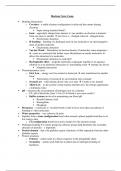 Popular
Popular
-
Comprehensive Biochemistry Mastery: From Molecular Bonds to Protein Dynamics
- Class notes • 7 pages • 2023
-
- $2.99
- 1x sold
- + learn more
This comprehensive compilation of biochemistry notes delves into the fundamental principles of molecular interactions and the architecture of biological systems. Starting with the basics of chemical bonding, it explores the robust covalent bonds forming life's building blocks and the subtler ionic interactions that drive complex biochemical processes. The document examines hydrogen bonding and Van der Waals forces, detailing their role in molecular stability and interactions, while also addressi...
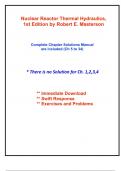 Popular
Popular
-
Solutions for Nuclear Reactor Thermal Hydraulics, 1st Edition Masterson (Chapters 5 to 34 included)
- Exam (elaborations) • 41 pages • 2024 Popular
-
- $29.49
- 1x sold
- + learn more
Complete Solutions Manual for Nuclear Reactor Thermal Hydraulics, 1st Edition by Robert E. Masterson ; ISBN13: 9781138035379.(Full Chapters included Chapter 5 to 34)..Chapter 1,2,3,4 Solutions not Available....5. Thermal Energy Production in Nuclear Power Plants 6. The Laws of Thermodynamics 7. Thermodynamic Properties and Equations of State 8. The Nuclear Steam Supply System and Reactor Heat Exchangers 9. Reactor Thermal Cycles 10. The Laws of Nuclear Heat Transfer 11. Heat Removal from N...
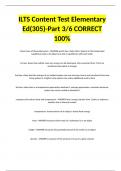
-
ILTS Content Test Elementary Ed(305)-Part 3/6 CORRECT 100%
- Exam (elaborations) • 36 pages • 2024
-
Available in package deal
-
- $12.99
- + learn more
4 basic laws of thermodynamics - ANSWER zeroth law: states that 2 objects in thermodynamic equilibrium with a 3rd object are also in equilibrium with each other 1st law: states that neither mass nor energy can be destroyed; only converted from 1 form to another(conservation of energy) 2nd law: states that the entropy of an isolated system can only increase; heat is not transferred from low temp system to a higher temp system one unless additional work is done 3rd law: states that as a t...
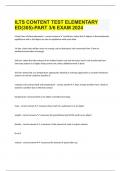
-
ILTS CONTENT TEST ELEMENTARY ED(305)-PART 3/6 EXAM 2024
- Exam (elaborations) • 37 pages • 2024
-
- $16.49
- + learn more
ILTS CONTENT TEST ELEMENTARY ED(305)-PART 3/6 EXAM 2024 4 basic laws of thermodynamics - correct answer zeroth law: states that 2 objects in thermodynamic equilibrium with a 3rd object are also in equilibrium with each other 1st law: states that neither mass nor energy can be destroyed; only converted from 1 form to another(conservation of energy) 2nd law: states that the entropy of an isolated system can only increase; heat is not transferred from low temp system to a higher temp syste...
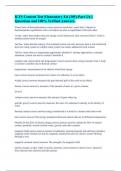
-
ILTS Content Test Elementary Ed (305)-Part 3/6 || Questions and 100% Verified Answers.
- Exam (elaborations) • 23 pages • 2024
- Available in package deal
-
- $13.99
- + learn more
4 basic laws of thermodynamics correct answers zeroth law: states that 2 objects in thermodynamic equilibrium with a 3rd object are also in equilibrium with each other 1st law: states that neither mass nor energy can be destroyed; only converted from 1 form to another(conservation of energy) 2nd law: states that the entropy of an isolated system can only increase; heat is not transferred from low temp system to a higher temp system one unless additional work is done 3rd law: states that...
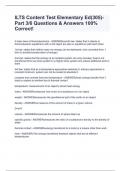
-
ILTS Content Test Elementary Ed(305)-Part 3/6 Questions & Answers 100% Correct!
- Exam (elaborations) • 26 pages • 2024
- Available in package deal
-
- $15.99
- + learn more
4 basic laws of thermodynamics - ANSWERszeroth law: states that 2 objects in thermodynamic equilibrium with a 3rd object are also in equilibrium with each other 1st law: states that neither mass nor energy can be destroyed; only converted from 1 form to another(conservation of energy) 2nd law: states that the entropy of an isolated system can only increase; heat is not transferred from low temp system to a higher temp system one unless additional work is done 3rd law: states that as a t...
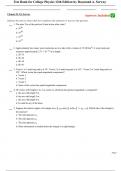
-
Test Bank for College Physics, 12th Edition by Raymond A. Serway
- Exam (elaborations) • 672 pages • 2024
-
- $29.49
- + learn more
Test Bank for College Physics 12e 12th Edition by Raymond A. Serway, Chris Vuille, John Hughes. Full Chapters test bank are included with answers (Chapter 1 to 30) Complete Guide 1. Units, Trigonometry, and Vectors. Standards of Measurements. Measurement Uncertainty and Estimation. Math Review. Vectors. Overview of Physics. 2. Motion in One Dimension. Displacement, Velocity, and Acceleration. Motion Diagrams and Graphs. One-Dimensional Motion with Constant Acceleration. Freely Falling Obje...
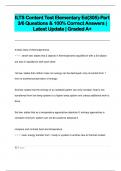
-
ILTS Content Test Elementary Ed(305)-Part 3/6 Questions & 100% Correct Answers | Latest Update | Graded A+
- Exam (elaborations) • 63 pages • 2024
- Available in package deal
-
- $13.99
- + learn more
4 basic laws of thermodynamics : zeroth law: states that 2 objects in thermodynamic equilibrium with a 3rd object are also in equilibrium with each other 1st law: states that neither mass nor energy can be destroyed; only converted from 1 form to another(conservation of energy) 2nd law: states that the entropy of an isolated system can only increase; heat is not transferred from low temp system to a higher temp system one unless additional work is done 3rd law: states that as a tempe...
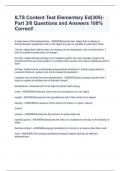
-
ILTS Content Test Elementary Ed(305)-Part 3/6 Questions and Answers 100% Correct!
- Exam (elaborations) • 26 pages • 2024
-
Available in package deal
-
- $12.99
- + learn more
ILTS Content Test Elementary Ed(305)-Part 3/6 Questions and Answers 100% Correct! 4 basic laws of thermodynamics - ANSWERszeroth law: states that 2 objects in thermodynamic equilibrium with a 3rd object are also in equilibrium with each other 1st law: states that neither mass nor energy can be destroyed; only converted from 1 form to another(conservation of energy) 2nd law: states that the entropy of an isolated system can only increase; heat is not transferred from low temp system to a...
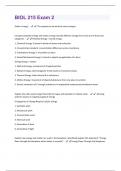
-
BIOL 215 Exam 2(Graded A+ actual test)
- Exam (elaborations) • 35 pages • 2024
- Available in package deal
-
- $7.99
- + learn more
Define 'energy'. - -The capacity to do work (to cause change) Compare potential energy and kinetic energy. Classify different energy forms into one of these two categories. - Potential Energy = stored energy 1. Chemical Energy: E stored in bonds of atoms and molecules 2. Concentration Gradient: concentration differences across membrane 3. Gravitational Energy: E of position or place 4. Stored Mechanical Energy: E stored in objects by application of a force Energy Energy = motion 1. Ele...

-
ILTS Content Test Elementary Ed(305)-Part 3/6 Practice Questions and Answers
- Exam (elaborations) • 41 pages • 2024
- Available in package deal
-
- $13.49
- + learn more
ILTS Content Test Elementary Ed(305)-Part 3/6 Practice Questions and Answers 4 basic laws of thermodynamics - Correct Answer ️️ -zeroth law: states that 2 objects in thermodynamic equilibrium with a 3rd object are also in equilibrium with each other 1st law: states that neither mass nor energy can be destroyed; only converted from 1 form to another(conservation of energy) 2nd law: states that the entropy of an isolated system can only increase; heat is not transferred from low temp sy...

How much did you already spend on Stuvia? Imagine there are plenty more of you out there paying for study notes, but this time YOU are the seller. Ka-ching! Discover all about earning on Stuvia


